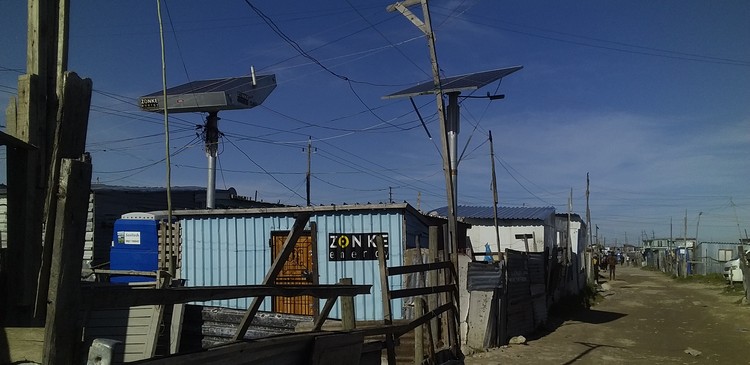
19 September 2022
Some of Zonke Energy’s mini-grid solar towers at Qandu Qandu informal settlement in Khayelitsha. Photos: Nombulelo Damba-Hendrik
Shack dwellers in Qandu Qandu informal settlement in Khayelitsha are unhappy and disillusioned by an empowerment initiative, the Umbane project, which is led by professors at the University of Cape Town (UCT) and the University of Exeter.
In 2020, the Umbane project, won the prestigious R10-million Newton Chair Prize for its initial work pairing solar mini-grids with pay-as-you-go vouchers. Its next phase was to help women use solar refrigeration to run small home businesses, and to teach them business skills.
But the shack dweller participants in Umbane say they were misled by the private solar energy company, Zonke Energy, which provides the solar grids for the project. They believed solar power would be free after the installation costs. The company flatly denies promising this.
Qandu Qandu, established in 2018 has about 5,000 shacks today, and no formal electricity. Kyle Cookson, of Eskom, said this is because the majority of the settlement is on wetlands and therefore cannot be electrified.
A sample group of 140 shacks were connected to Zonke Energy’s mini-solar towers in mid-2020. Each mini-grid tower is connected to about ten shacks.
Households paid a R400 installation fee. But what they had not expected were the high running costs. To have solar lights in their homes, people pay R150 a month. To run a television, it is R250 per month. For daily packages, people pay R5 for lights and phone charging, R8 to include a TV.
The 31 women who signed up for the Umbane project had to buy solar-compatible fridges for R3,500, and pay R480 a month to run it. (Depending on the model, a domestic fridge on average uses 1 to 2KwH per day, and in Cape Town, and on a prepaid metre, it will cost R80 to R160 per month to run.)
Zoliswa Mtshali and other residents thought that because solar relies on the sun, it would be free. “To our surprise, we were told to buy prepaid coupons in order to have power,” she said.
Mtshali said her power is now off because she has not been able to pay her R480 fridge bill. “I’m now stuck with a fridge that only uses solar energy,” she said.
The women also believed they would get start up funding for their solar-powered refrigeration businesses.
“We were promised funds, and the company advised us to buy fridges from them that use solar energy. After that, we attended business skills classes with certificates after the training,” said Mtshali.
They received their certificates in April 2022. The certificate of participation in the “Business Bootcamp Sessions” has the University of Exeter, UCT and Zonke emblazoned on it.
Community leader Pamela Memani confirmed Mtshali’s statement about the funding. She said they submitted their business plans to Umbane and understood that funding would vary depending on the plan and what they intended to sell.
“I attended their business training … We have certificates. We are waiting for them to give us the money they promised us, so we can start our business,” she said.
But Siseko Siwali of Umbane denies that any funding promises were made.
“We introduced the fridge package from Zonke Energy. The business skills were a bonus to make sure that they continue their business with proper skills.”
“Unfortunately for some, their businesses are not doing well,” said Siwali.
Meanwhile, Zonke Energy technical director Alex Densmore, also said, “As far as I am aware, none of the participants were promised funds for starting a business.”
He said the company offers “clean and affordable energy to off-grid informal settlements”.
Densmore said in communities where Eskom (grid) power is not an option people use paraffin and illegal connections, which are also expensive and extremely dangerous. “Therefore, our service is more appropriately compared to their existing, actual options rather than the grid, which they cannot access. On this basis we are very affordable and competitive.”
“Zonke Energy is a completely unsubsidised, private entity … Eskom’s power is highly subsidised and their infrastructure costs have been amortised over decades. Additionally, our infrastructure is off-grid and therefore requires large batteries to cover nights and bad weather periods, which can add to the cost.”
“Our offering is completely pay-as-you-go. Clients are not required to pay for any length of time. There are no long-term contracts,” he said.
Professor Federico Caprotti from the University of Exeter, who is a leader of the Umbane project in the partnership with Dr Jiska de Groot, an expert in clean and sustainable energy at UCT, said the project was there to assist or enable people in informal settlements to run their businesses.
He said they received funding for the project, but it was not designed to be free.
“With funding you only get a certain amount. Once the money is finished, it’s finished. Our plan is to continue the project, giving an energy solution to informal settlements that do not have electricity,” he said.
He said it was to enable people living in informal settlements to start or continue with their businesses.
“We choose women because it is they who run these small businesses and who are also risking their lives using paraffin and candles,” he said
He said Zonke Energy installed the solar power and sold the fridges.
Pamela Memani was part of the group who completed the business skills training with Umbane. She says they thought the project would be “a solution to our lack of electricity problems but it digs deep into our pockets”.